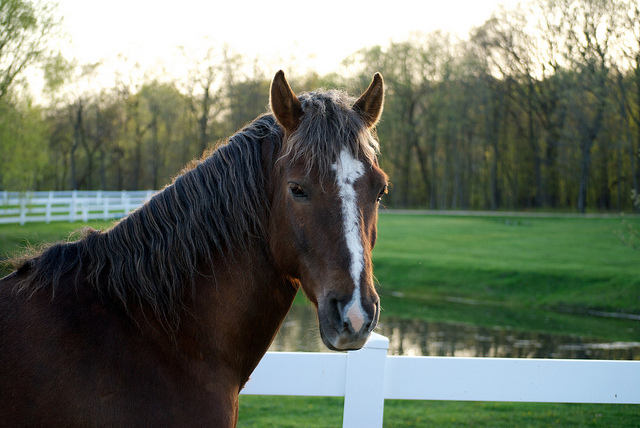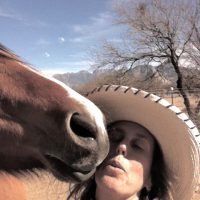When I found the video below, it brought me to tears.
This week I had—what can only be described as—a spirit-driven encounter with a veteran. In my work with horses, I have had the great privilege and honor to work with veterans at two of the therapeutic riding centers I’ve worked at—in both Colorado and California.
There is something incredibly humbling about standing with these men and women who have served our country, and to be witness to the deep pain and suffering they now live with as a result. The horrors of war embodied and realized.
This week I went to the market to pick up a couple of things. I don’t typically park directly in front of the store—but today I did—and I noticed a beautiful Native man sitting on the ledge of a mechanical toy horse. He was dressed in a blue-checkered, button-down shirt and khaki pants. By his side was a speckled companion.
I was compelled to look into his eyes and say, “Hello,” as I walked into the store. He didn’t ask for anything—he just looked back at me, smiled and said, “Hello.”
As I walked out, carrying my arugula and yellow pepper, he rose and walked toward me. He said, “You work with horses?”
A shiver went up my spine.
“Yes I do,” I responded, wondering how on earth he knew that.
“I saw the medicine stick on your dashboard,” he said. “I am a war veteran, a Navajo, and I used to work and train horses on the reservation.”
Interestingly, the medicine stick is something I created during a one-day vision quest with Huichol Shaman, Tom Soloway Pinkson. It is wrapped with turkey feathers and brightly colored yarn, with horse hair from both Annie Two-Moons (my first horse) and DreamWeaver Sunday (the mare I partner with now).
More shivers.
We began a conversation—human to human, eye to eye—and as I began to truly “see” him, I noticed that his khakis were stained and worn, revealing a much different story then I’d first imagined.
His story poured out. He was a veteran of the Kuwait war—“The first war,” he called it.
He suffers from PTSD and has been trying to keep his life together. He had just returned from an attempt back on the reservation and has come back to California to be near his adopted “anglo” grandmother—who then walked out of the store, her arms full of food she handed to him.
“My dog helps—he keeps me sane and safe. His name is Yodi,” he said.
We talked for awhile about his life with the horses, and the Navajo dialect interspersed as he spoke. He shared how it’s been hard to get a lot of support from the VA and that he’s determined to stay healthy “this time.”
It was hard to keep the tears from rising. I felt incredible compassion for this soul.
I told him about my work with the veterans at the riding center, where I work part time, and the transformations I’d seen occur, as they were seen unconditionally through the eyes of a horse. I wrote down the name of the center for him on a piece of paper and handed it to him.
He looked down at the page and said, “Oh, I was supposed to go there last week with the other veterans, and I could not get over the bay bridge.” And sure enough, we did have veterans out to the center the week before.
I gave him the phone number to the center and invited him to call to see if we could set him up with some support and time with the herd. I pray he takes the step.
As I began to turn to walk away, he took a step toward me, outstretching his arms in an offering. I stepped toward him receiving the warmest hug I’ve had in a long time.
He thanked me, and I thanked him. This was an intimate exchange of humanity.
I watched him walk away, thanking Spirit for bringing this gift of love and compassion into my day.
.
.
Relephant:
Transforming Trauma: Helping Veterans Experience the Healing Power of Horses.
Author: Sheri Gaynor
Editor: Yoli Ramazzina
Photo: Flickr/Pete Markham









Read 1 comment and reply